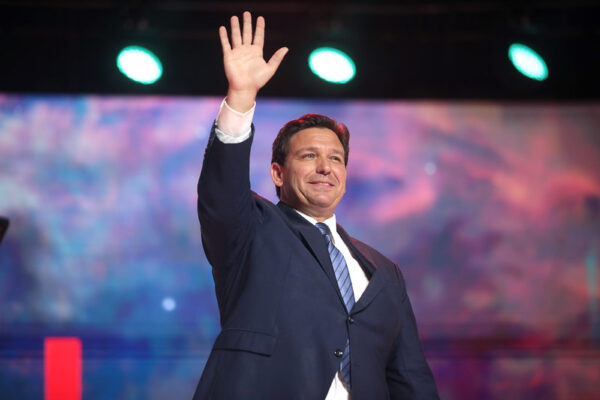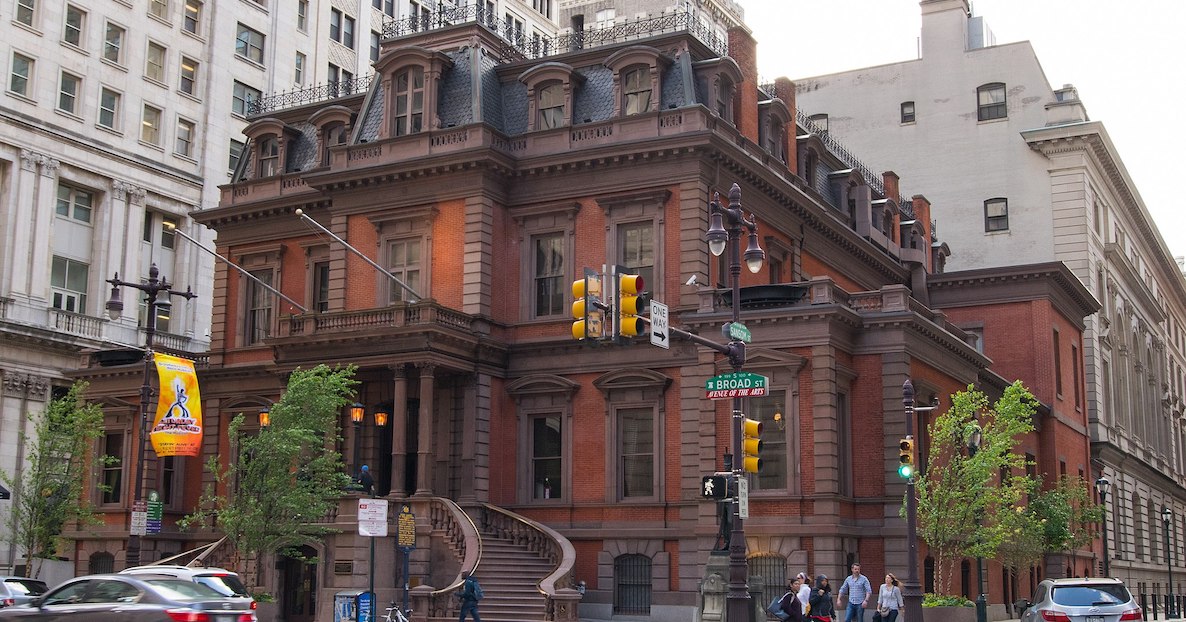Last November, when the Union League, the old guard bastion of the powerful and connected in Philadelphia, announced its plans to award its highest honor to Florida governor Ron DeSantis, it made clear to anyone who was paying attention just where it stands in our national and local conversation on democracy and civic culture.
The announcement was followed by a rare internal backlash, as controversial as anything the club has had in recent years, with several members objecting to the choice, talking to the press, and imploring League leadership to rescind the award. Much of that objection was led by Black members of the League — a small but vocal minority of members.
Turning DeSantis into a hero signals what the League stands for. And, unfortunately, what it seems to stand for are not the values we most need in our city and country: Community. Decency. Democracy.
In light of hurricane damage to his state, DeSantis postponed his visit, giving the League leadership a chance to reconsider its decision to applaud the Florida governor whose various public acts of politics have included cruelly putting undocumented migrants on a plane to Martha’s Vineyard; touring the country stumping for election deniers and insurrectionists (including Pennsylvania’s Doug Mastriano); pushing through (more) legislation that makes it harder for people in his state to vote; gagging public school teachers from talking about gender identity; and, just last week, banning the teaching of AP African American studies, a move described by The Washington Post’s Jennifer Rubin thusly:
The DeSantis administration’s actions put to lie the notion that the attack on “critical race theory” is aimed at “socialist ideas” or educationally suspect pedagogy. This is about rewriting history to wipe out a critical part of our American experience, to deny the wrongs done to millions of Americans and to exempt institutions from the obligation to take a hard look at remedying past injustice.
Instead, the League responded to criticisms by, apparently, threatening members who speak out publicly with dismissal. And today, the storied organization is fulfilling its promise by giving DeSantis its Gold Medal just steps away from City Hall.
The kerfuffle has highlighted the stark political divisions in America and Philadelphia, the gulf between old and new styles of civic leadership here, and the role a still haughty and secretive club plays in shaping the conversation in our city. It also highlighted where we might be headed.
The legacy Union League members want?
According to a letter sent to some members from Union League president Craig Mills, executive shareholder at law firm Buchanan Ingersoll & Rooney, “the 400 seats that were made available for this event last week sold out in 15 minutes. Since each member was only able to reserve a spot for themselves and one guest, that represents 200 members enthusiastically supporting this event within a quarter-hour. Ultimately we expect to seat up to 750, and disappoint hundreds more.”
Mills went on to say what is undoubtedly true: “This award was not the action of a faction, nor has it the support of a faction, but rather the overwhelming majority of our membership.”
Let me pause here to acknowledge a couple of facts: The Union League is a private club that can honor whomever it wants. It was founded more than 150 years ago as an abolitionist organization to support the Union Army during the Civil War, when the Republican Party was led by President Abraham Lincoln. It has mostly remained a bastion of old-boy Republicanism; the only Democrat among the club’s hall of presidential portraits is Andrew Jackson. Legendary Attorney William T. Coleman Jr. was the first Black man to become a member in 1974; the first women were elected members in 1986.
The Gold Medal is awarded to public figures only some years — which means DeSantis must have been deemed very worthy.
The Gold Medal is awarded to public figures only some years — which means DeSantis must have been deemed very worthy — based on a set of criteria that, Mills wrote embodies the League’s core values: “support for the Constitution and the free enterprise system, limited government, individual rights and responsibility, and support for our military and law enforcement.”
Among the other Gold Medal winners over the years were both President Bushes; Defense Secretary Donald Rumsfeld; U.S. Supreme Court Justices Sandra Day O’Connor, William Rehnquist and Antonin Scalia; Dick Cheney, John McCain and Tom Ridge.

Even among that group DeSantis, a conservative Republican who built a national following among other conservative Republicans for his leadership during Covid (“through COVID and beyond, Gov. DeSantis has run a state to which citizens of other states flee, not one from which they flee,” Mills wrote.) is an outlier. Unlike those others, he’s more of a Trump-like performative pol than a visionary or coalition-builder; note, for example, his non-answers when asked about whether the 2020 election results were rigged. (They weren’t.) He engages in stunt politics — the migrant flight, the firing of his state’s duly-elected Attorney General, his public battles with Disney — that are not governing so much as pandering.
Still, inviting DeSantis to speak at the Club could be an exercise in free thought; his views on almost everything, after all, are a stark contrast to the political ideology that so often prevails in Philadelphia. But that, as the members who have been critical have said, is not the same thing as bestowing on him the Union League’s highest honor.
Turning DeSantis into a hero signals what the League, and by extension its 4,000 members, stands for. And, unfortunately, what it seems like it stands for is not the values we most need in our city and country: Community. Decency. Democracy.
Former City Council member George Burrell (who is not a club member) put it this way in a widely-distributed note to powerful friends: “Governor DeSantis is unacceptable, not because he is Republican, conservative or a potential candidate for president, but because he ruthlessly and intentionally uses race and immigrants as divisive tools, to incite White voters and marginalize Blacks.”
Is that really the message our most elite and storied social club wants to send to Philadelphians? Is that really what the members, who are also leaders — of companies, organizations, institutions, many of whom in 2020 swore they had awoken to the realities of racial inequity — want their legacy to be?
Imagine, instead, the signal the Union League could have sent had they announced they were presenting their Gold Medal to a different public official with genuinely conservative — but also genuinely American — values: Representative Liz Cheney, a champion of fair and free elections; or Senator Tim Scott, without whom we wouldn’t have had the bipartisan criminal justice reform, the First Step Act, during the Trump presidency. That could have been tremendous.
A sign of change … maybe?
Look, far be it for me to tell the Union League its business. The club has had quite a revival the last several years, buying up golf courses, Gladwyne’s Guard House and Stone Harbor’s The Bungalow restaurants, earlier poaching the Four Seasons chef, growing its numbers and its revenue. Its leadership — elected by the membership, after all — seems to have its fingers on the pulse of what members want.
A source tells me that over 30 people in League leadership — which includes the awards committee, made up of past League presidents — approved giving DeSantis the Gold Medal with no opposition. After all that growth, this seems like an unforced error that has led some smart, young business leaders in town to question if the Union League is where they should spend their time, money and influence.
The veil of secrecy behind all this is maybe the most striking thing. Several members (politely) refused to talk with me for this story because of a rule against telling outsiders what goes on inside the Union League’s hallowed walls, like it’s some kind of grown up Skull & Bones Society. Standing shoulder to shoulder in secrecy despite what at least one person said were “strong feelings” about DeSantis’ invitation seems a sign of an old Philadelphia where powerful men made decisions for the rest of us in back rooms, privileging the few over the many.
Still, what happened after the announcement is, perhaps, a sign of where the League and maybe the city is headed. A small group of Union League members objected privately to Mills and the other members of the leadership, and several Black members complained publicly to a Philadelphia Tribune reporter (bucking the rules):
Thomas McGill, a partner at the firm Kenny, Burns & McGill who has been a member of the Union League for nearly a decade, said he feels extremely dismayed at the organization’s decision. …
“He is about as close to MAGA and Trump as you’re going to get, and anyone who is endorsing candidates that are running on Donald Trump’s MAGA philosophy are just plain wrong and anti-democratic, (which is) everything that the Union League is supposed to stand for.”
As the Tribune noted, the League now has a “Frederick Douglass Table” (essentially a club within the club); that was formed shortly after they installed a portrait of the former slave-turned-abolitionist in their Broad Street building. That seems like the kind of change that could signal a broadening of perspective, an opening of sorts to welcome a new, more racially diverse set of members.
The DeSantis kerfuffle is in some ways the mirror image of what happened at its Chicago sister club in January, when that city’s Union League invited journalist Nikole Hannah-Jones, creator of the 1619 Project, to speak on Martin Luther King, Jr. Day. Several members objected to Hannah-Jones’s invitation on the grounds that it would “dishonor Dr. King” because she was a “discredited activist” and “unworthy of such association with King,” she said on Twitter. Despite the internal protest, the invitation held, and Hannah-Jones gave a badass speech made up entirely of MLK excerpts.
In our own city, the Fitler Club (a partner of The Citizen) opened on the other side of town a few years ago as a pointed alternative to the Union League, with lower fees and a deliberate focus on diversity (age and race), and on social good. It’s still finding its footing, and the pandemic was hard on the fledgling club, but the question it poses seems more relevant now than ever: Are we an old-school Union League town — secretive, exclusive, boosters of the likes of DeSantis? Or, are we a forward-looking community of Philadelphians looking for ways to boost the principles on which our city was founded?
Correction: An earlier version of this story misstated the name of the course Ron DeSantis’s administration banned in high school. It is AP African American studies.
![]() MORE ON PHILADELPHIA’S POLITICS AND VALUES FROM THE CITIZEN
MORE ON PHILADELPHIA’S POLITICS AND VALUES FROM THE CITIZEN
Union League of Philadelphia. Courtesy of Wikimedia.




